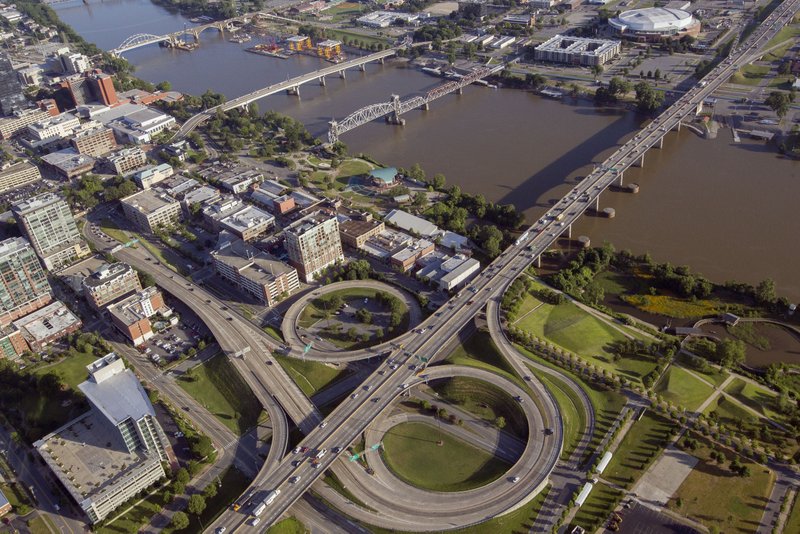A judge has enjoined the the Arkansas Department of Transportation from spending any money on the $1 billion 30 Crossing project generated by a state sales tax set to take effect next year.
The ruling by Pulaski County Circuit Judge Mackie Pierce specifically blocked the department from spending $350 million in Amendment 101 proceeds that it committed to help pay for the overhaul of the 6.7-mile Interstate 30 corridor through downtown Little Rock and North Little Rock, which includes replacing the I-30 bridge over the Arkansas River.
Under the ruling, no money generated under the amendment can be spent on the project.
The legal setback is the second involving the project and its funding sources.
The Arkansas Supreme Court ruled in October 2020 that proceeds from Amendment 91 to the state Constitution couldn't be spent on 30 Crossing.
Both amendments devote proceeds from a half-percent statewide sales tax to road and bridge construction and for maintenance projects. Amendment 91, approved by voters in 2012, expires next year, to be replaced with Amendment 101, which voters approved in 2020.
The Supreme Court ruling came in a lawsuit that said a strict reading of the amendment language limited the Amendment 91 money to road projects that are four lanes or fewer. The 30 Crossing project involves a six-lane stretch of I-30.
When the Supreme Court ruled on Amendment 91, the Arkansas Department of Transportation committed the Amendment 101 money to 30 Crossing.
The high court's "interpretation of a constitutional provision becomes a part of the provision, so the use of money from Amendment 101 is subject to the same restrictions that apply to Amendment 91," Pierce wrote in the seven-page ruling issued Feb. 8.
Neither amendment contains language specifying work on roads exceeding four lanes, he said.
"If the General Assembly had intended the tax imposed by Amendment 91 and now to be continued by Amendment 101 to be used for major improvements to six-lane highways, they could have expressly so stated," Pierce wrote.
Amendment 101, he added, did only two things different from Amendment 91: "It eliminates the termination of Amendment 91 and ... it prohibits the state or ArDOT [Arkansas Department of Transportation] from security bonds from Amendment 101 proceeds. In other words, Amendment 101 continues the 0.5% sales tax in perpetuity."
However, Pierce did side with the department on other projects that were widened from four lanes to six lanes. The lawsuit sought to have the agency reimburse the Amendment 91 bond account for those projects, which included a completed section of Interstate 630 in west Little Rock that cost $87.4 million and an ongoing $187.3 million project on a section of I-30 in Saline County.
Adding a lane or lanes constitutes improvements to a four-lane highway, he said. "Accordingly, defendants did not spend Amendment 91 funds improperly by widening four-lane highways."
Further, Pierce said the plaintiffs raised and abandoned the issue in the case that went to the Supreme Court.
Richard Mays, a Little Rock attorney who represented a coalition of downtown neighborhoods and residents in the case, praised the judge's ruling to a point.
"He followed established precedent and ensured that the Arkansas Department of Transportation will use the money for its intended purpose, rather than expanding six and eight lane interstate highways," Mays said in an email. "In doing so, he saved the State $350 million that would have been spent on the widening of I-30 through Little Rock."
He expressed disappointment with Pierce's ruling that the department didn't have to repay the money it spent on widening four-lane interstates in Central and Northwest Arkansas to six lanes.
"We firmly believe that the intent of Amendment 91 was that Amendment 91 tax revenues be spent only on construction and development of four-lane highways throughout the State," Mays said. "However, we understand the basis for his opinion on that issue, and respect it."
The Transportation Department was preparing a response Monday but it wouldn't be ready until today, agency spokesman Dave Parker said.
Work on the 30 Crossing project, the largest project the Transportation Department has undertaken, began in September 2020. The corridor stretches from Interstate 530 in Little Rock to Interstate 40 in North Little Rock. In addition to replacing the Arkansas River bridge, improvements to I-40 between Arkansas 107 and U.S. 67/167 in North Little Rock are part of the project.
The money being used to pay for the work includes a mix of federal tax dollars set aside for bridges and other federal money in addition to the money the state set aside for it under its $1.8 billion Connecting Arkansas Program, which focused on regionally significant projects around the state. Amendment 91 proceeds have helped finance that program, which covers 36 projects in 19 corridors.
Amendment 91 raises about $230 million annually, 70% of which goes to the Transportation Department. The remainder is split between cities and counties.

